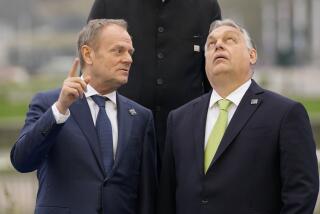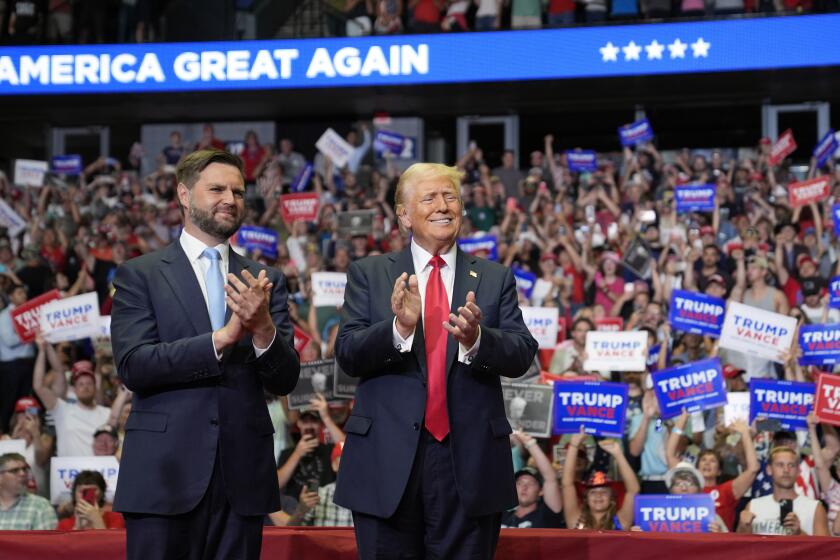Ukraine signs political accord with European Union
LONDON — Ukraine was tugged in opposite directions Friday in a reminder of the Cold War past, with the government in Kiev pushing westward through closer ties to the European Union and Russia pulling Crimea eastward by formally annexing it.
Separate signing ceremonies in Brussels and Moscow illustrated the rapidly diverging paths of Ukraine and the Crimean peninsula, which Ukraine insists still belongs to it but which Russia claims as its own. The dispute over the strategically important region has led to perhaps the most serious confrontation between the West and Russia since the collapse of the Soviet Union.
There were a few indications Friday that the penalties imposed on Russia by the United States and Europe were having some of their intended effect. Russian President Vladimir Putin signaled a possible pause in the mutual retaliation between the two sides.
In Brussels, Ukrainian officials sealed a deal deepening political cooperation with the 28-nation European Union. The pact revived an agreement that the EU offered to Ukraine several months ago that then-President Viktor Yanukovich rejected in favor of closer ties with Moscow, a last-minute turnaround that led to months of protests, Yanukovich’s ouster and Russia’s incursion into Crimea.
The signing of the EU deal, which includes security and defense cooperation, risks further angering Moscow, which sees a Europe-leaning Ukraine as a threat. But an elated and relieved-looking Arseny Yatsenyuk, Ukraine’s interim prime minister, brushed aside such concern.
“Frankly speaking, I don’t care about Russia [in] signing this deal. I care about Ukraine, Ukrainians and our European future,” Yatsenyuk said. “This deal meets an aspiration of millions of Ukrainians who want to be a part of the European Union.”
EU membership is not on offer. But the agreement puts Ukraine squarely in the orbit of the EU, which pledged to sign the accord immediately as a riposte to Russia’s armed takeover of Crimea.
The economic component of the original pact was not included; that is being deferred until after Ukrainian elections in May. In an additional dig at Moscow, the EU said it would sign similar political agreements with Georgia and Moldova — which Russia sees as also properly in its own sphere of influence — no later than June.
The deal with Ukraine “symbolizes the importance that both sides attach to this relationship and our joint will to take it further,” European Council President Herman Van Rompuy said. “It recognizes the aspirations of the people of Ukraine to live in a country governed by values, by democracy and the rule of law.”
In a rival ceremony in Moscow, Putin completed the annexation of Crimea by signing legislation making it part of Russia. The formal transfer, deemed illegitimate by the West, occurred less than a week after a referendum in Crimea, backed by Russian guns, asked voters whether they wanted to secede from Ukraine.
Putin appeared in high spirits during a partially televised meeting of Russia’s Security Council, poking fun at the Western sanctions against officials deemed close to him. When his foreign minister told him that about 20 names were on the blacklist, Putin quipped, “We need to stay away from them as they compromise us,” which drew laughter from the others in the room.
He added that he would open a personal account Monday at Bank Rossiya, which is run by his close friend Yuri Kovalchuk. The banker is on the sanctions list.
But Putin also said he saw no need for an immediate retaliation against Western sanctions beyond the bans on travel to Russia that the Kremlin issued for a few U.S. lawmakers.
There were signs that the sanctions might be starting to bite.
A number of credit-rating agencies have downgraded their outlooks on Russia, and Putin’s finance minister suggested, in remarks carried by Russian news agencies, that Moscow might forgo trying to borrow $7 billion in the bond market if oil and gas revenues remained steady.
Russia’s main stock market lost 2% in value Friday. And Bloomberg reported that Canadian airplane manufacturer Bombardier was postponing plans to set up an assembly line in Russia and to sell to a Russian state-owned company dozens of turboprop planes worth up to $3.4 billion.
Earlier, the leaders of the EU nations said they intended to add a dozen names to the list of mostly Russian and Crimean officials on whom they’ve imposed travel bans and asset freezes in response to the Crimean crisis. The leaders also instructed EU staffers to come up with possible economic sanctions on Moscow if the situation deteriorates — namely, if Russian forces move into eastern Ukraine.
In an unexpected move, the EU said it was imposing a near-embargo on any goods from Crimea that did not transit through Ukraine.
“We will only accept Crimean goods in the EU if they come from Ukraine and not Russia,” British Prime Minister David Cameron said. “From now on, goods from Crimea have to come through Ukraine or they’re going to get very hefty penalties and tariffs put on them.”
Yatsenyuk said that “the best way to contain Russia is to impose real economic leverage over them,” and he criticized Moscow’s attempt to “impose a new post-Cold War order and to revise the results of the Second World War.”
Some analysts said Western officials were apparently working out a division of labor, with Washington taking the lead on tough sanctions while Europe focuses on drawing Ukraine away from Moscow.
The approach is a “two-track, tag-team arrangement,” said Cliff Kupchan of the Eurasia Group risk-consulting firm.
European officials “can start to pull Ukraine politically, economically and militarily toward them,” said Kupchan, a former State Department official. Control of Ukraine “is what Putin really cares about, so what the EU is doing pokes the bear’s belly more than sanctions on Putin’s buddies.”
But a pro-Kremlin political scientist in Moscow ridiculed the new accord between Brussels and Kiev and called for an invasion of Ukraine to keep it from going into effect.
“The Kremlin should stop this farce and deploy Russian troops in Ukraine as soon as possible to create a situation for really free and democratic elections,” said Sergei Markov, vice president of Plekhanov Russian University of Economics. “We will not allow Russians and Ukrainians in Ukraine to be turned into slaves.”
Russian Prime Minister Dmitry Medvedev said Russia should demand $16 billion from Ukraine for debts and lost profits in various deals between the two nations over the last decade.
In Crimea, 72 Ukrainian army and navy units have switched allegiance to Moscow since Russian troops took over the peninsula in recent weeks, Russian Defense Minister Sergei Shoigu said.
But at least two units were still resisting Russian pressure. Near the Belbek military airport, which is controlled by Russian troops, a Ukrainian army unit remained barricaded in its barracks.
“The Ukrainians have placed heavy machine guns around the perimeter of their base and are prepared to protect it at all costs,” freelance journalist Oleg Klimov said in a phone interview from the scene.
At Donuzlav Lake, the Ukrainian navy was trying to remove vessels sunk by Russians in the waterway leading to the Black Sea, the UNIAN news agency reported. The blockage is preventing at least seven Ukrainian naval vessels from reaching the sea.
Chu reported from London and Loiko from Moscow.
Times staff writer Paul Richter in Washington contributed to this report.
More to Read
Sign up for Essential California
The most important California stories and recommendations in your inbox every morning.
You may occasionally receive promotional content from the Los Angeles Times.











